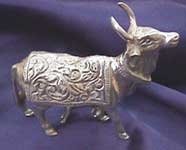 Link to BBC Report
Link to BBC ReportParanoia concerning the possibility of giving any credibility to any form of creationism has reached such a pitch that providing accurate data concerning the history of a scientific controversy is treated with outraged hysteria.
The very idea that some excellent palaeontologists used to interpret the fossil record in a radically different way to the way palaeontologists do today is seen as capitulating to the enemy.
If anything indicates the status of the theory of evolution as a sacred cow for a materialistic community then this does!
If we are so afraid to teach children the truth about a particular piece of the history of science that we start seeing red when someone suggests it then there is something extraordinarily interesting going on… at least to my mind.
See the Bigglesworth principle!
The storm has erupted because the following words are in the OCR gateway to Science syllabus:
"explain that the fossil record has been interpreted differently over time (e.g. creationist interpretation)".
This is in the context of the National Curriculum statement:
"Students should be taught how scientific controversies can arise from different ways of interpreting empirical evidence (for example Darwin's theory of evolution)."
And students should consider:
"ways in which scientific work may be affected by the context in which it takes place (for example, social, historical, moral, spiritual), and how these contexts may affect whether or not ideas are accepted."
James Williams, science course leader at Sussex University's school of education
"This opens a legitimate gate for the inclusion of creationism or intelligent design in science classes as if they were legitimate theories on a par with evolution fact and theory.
"I'm happy for religious theories to be considered in religious education, but not in science where consideration could lead to a false verification of their status as being equal to scientific theories."
The debate in the UK was also stirred up by the answer that Jacqui Smith gave to Keith Vaz’s question on 27th February appearing to open the gateway to the presentation of creationism and intelligent design in science in the context of scientific controversies. (Here)
Keith Vaz: To ask the Secretary of State for Education and Skills what her policy is on the
teaching of creationism as a subject in schools; and if she will make a statement. [49613]
Jacqui Smith: Neither creationism nor intelligent design is taught as a subject in schools. The national curriculum programme of study for science at key stage 4 covers evolution. It sets out that pupils should be taught "that the fossil record is evidence for evolution" and also "how variation and selection may lead to evolution or extinction". Pupils should however be taught about "how scientific controversies can arise from different ways of interpreting empirical evidence". Also, the biblical view of creation can be taught in RE lessons, where pupils are taught to consider opposing theories and come to their own, reasoned conclusions. Therefore, although creationism and intelligent design are not part of the national curriculum, they could be covered in these contexts.
The relevant document from OCR is here.
The OCR biology specification:
At the standard level a research activity is suggested:
“Research to find out about the differentinterpretations of the fossil record.”
At the higher level students should be able to:
"explain that the fossil record has been interpreted differently over time (e.g. creationist interpretation)".
This is in the context of a syllabus that is positively glowing in its support for evolution!
7 comments:
Frankly we just don't trust the blighters. And with some reason, I might add.
(Note: that second link is heavily Dawkins-based, but the details have been confirmed independently. ACE really is as atrocious as it sounds.)
Lifewish,
When you said:
"ACE really is as atrocious as it sounds."
How much actual data did you have in mind?
Quotes from their syllabi, mostly taken from this article, as well as from a couple of remote acquaintances who claim to have read the material. At some point I intend to purchase some of their biology stuff - I'll give you a more detailed overview when I've actually read it in person.
Lifewish,
ACE should not be judged solely by its biology syllabus...nor even by its science syllabus...nor even solely by its entire syllabus.
Comparing education systems is a difficult business. Frankly my experiences with much of what the state schools in the UK produce in terms of basic behaviour standards is disgraceful.
Allygally,
The point being made in the syllabus is an important history of science issue. There was a time when excellent palaeontologists interpreted the fossil record very differently form the way palaeontologists do today. Learning to "rediscover" the discoveries of scientists is the best way of learning science but you need to try and get inside a totally different mindset...rather like you are having to do to talk to me!
ACE should not be judged solely by its biology syllabus...nor even by its science syllabus...nor even solely by its entire syllabus.
Comparing education systems is a difficult business. Frankly my experiences with much of what the state schools in the UK produce in terms of basic behaviour standards is disgraceful.
My understanding (possibly horribly inaccurate) was that ACE consisted entirely of syllabi and associated teaching resources. Correct me if I'm wrong.
Surely behaviour is something that only individual teachers and schools, rather than any sort of advisory group, can deal with? As such, I wouldn't have thought it would have any direct effect whether a school was using the ACE materials or normal textbooks.
Horribly off-topic, but I thought you might be interested in this new blog that someone's started up to discuss maths. He says all the things I've been saying about information theory, except in more depth, so of course he must be right :P
Seriously though, the guy appears to actually have a clue about the mathematical concepts he's discussing. Well worth reading.
Post a Comment